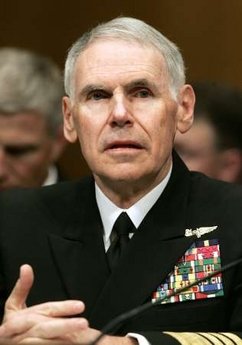
U.S. Central Command Navy Adm. William Fallon
Fallon Resigns as Mideast Military Chief
WASHINGTON
The top U.S. military commander for the Middle East resigned Tuesday amid speculation about a rift over U.S. policy in Iran. Defense Secretary Robert Gates said that Adm. William J. Fallon, whose area of responsibility includes Iraq, had asked for permission to retire and that Gates agreed.
Gates said the decision, effective March 31, was entirely Fallon’s and that Gates believed it was “the right thing to do.”
Fallon was the subject of an article published last week in Esquire magazine that portrayed him as opposed to President Bush’s Iran policy. It described Fallon as a lone voice against taking military action to stop the Iranian nuclear program.
“Recent press reports suggesting a disconnect between my views and the president’s policy objectives have become a distraction at a critical time and hamper efforts in the Centcom region,” Fallon, who is traveling in Iraq, said in a statement issued by his U.S. headquarters in Tampa, Fla.
“And although I don’t believe there have ever been any differences about the objectives of our policy in the Central Command area of responsibility, the simple perception that there is makes it difficult for me to effectively serve America’s interests there,” he said.
President Bush praised Fallon in a statement. “During his tenure at Centcom, Admiral Fallon’s job has been to help ensure that America’s military forces are ready to meet the threats of an often-troubled region of the world, and he deserves considerable credit for progress that has been made there, especially in Iraq and Afghanistan,” Bush said.
Gates announced that Fallon’s top deputy, Army Lt. Gen. Martin Dempsey, will take over temporarily when Fallon leaves. A permanent successor, requiring nomination by the president and confirmation by the Senate, might not be designated in the near term.
Dempsey could be elevated to Central Command chief, although he already has been selected to become the top U.S. Army general in Europe. Among other possible candidates for the post — considered one of the most important in the U.S. military — is Army Lt. Gen. Stanley McChrystal, who had just been named to a top post on the Joint Chiefs of Staff and who had been commander of U.S. special operations forces in Iraq.
Another possibility is Army Lt. Gen. Peter Chiarelli, who serves as Gates’ senior military assistant and is a former senior commander in Iraq.
Gates described as “ridiculous” any notion that Fallon’s departure signals the United States is planning to go to war with Iran. And he said “there is a misperception” that Fallon disagrees with the administration’s approach to Iran.
“I don’t think there were differences at all,” Gates added. He said he believed Fallon was fully supportive of the administration’s policy on dealing with Iran through diplomatic and economic pressures.
Fallon, 63, a veteran of the Vietnam War and a former vice chief of naval operations, has had a 41-year Navy career. He took the Central Command post on March 16, 2007, succeeding Army Gen. John Abizaid, who retired. Fallon previously served as commander of U.S. Pacific Command.
Gates called Fallon a very able military strategist and said his advice will be missed at the Pentagon.
“I think this is a cumulative kind of thing,” said Gates, speaking of the circumstances leading up to Fallon’s decision. “It isn’t the result of any one article or any one issue.”

Wild Thing’s comment……..
From a policy standpoint it makes little sense to use the threat of war as a diplomatic tool if your commanding general is openly opposed to it. I think this move may be more in line with keeping all our options open. Iran doesn’t understand subtlety.

No, they don’t understand it at all.
But like you said, don’t threaten anyone if everyone else is opposed to it.
You don’t poke snakes with sharp sticks!
Some 45 years ago the then current administration was trying to prosecute a war against an equally stubborn enemy, our president at the time surrounded himself with pusillanimous advisors and downright traitors in his cabinet even relying on Walter Cronkite to make pass or fail decisions. At extremely high costs in lives and resources we were winning all the challenges on the ground, it was the candy-assed gutless wonders in DC that resulted in the total loss of that war on the political front. I have two thoughts on Fallon’s resignation, one is that he was asked to resign due to sharp differences with his boss that affect the troop morale and the perception of the leaders by the enemy and two, there is a new sheriff coming to town and Fallon doesn’t want the same legacy of failure dropped on him as that of Admiral Husband Kimmel and Army Lieutenant General Walter Short who became the scapegoats for the failures of their superiors prior to the attack on Pearl Harbor. You can bet your sweet bippy that a Hillary or Obama presidency will blame the military for their capitulation.
In either case if the leader doesn’t have the will to win don’t let them lead anymore of our youth to their deaths. There is a place at the UN for those who don’t want to live free and protect their homeland, if Fallon is of that character then let him join Condi in that slow dance of death known as negotiated peace.
Lynn, good expression…..”You don’t poke snakes with sharp sticks!”
Jack those are such important things to consider, I had not thought of those. Yes there are many things involved in this that could very well be what is happening.
Splash one Rear Admiral or future CNN analyst? Rumsfeld had us all fooled at one time … truthfully!
Darth yes he did and I was such a huge Rummy fan for a long time. Then disappointment set it.